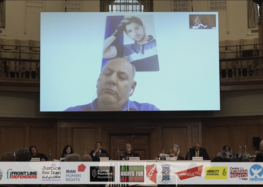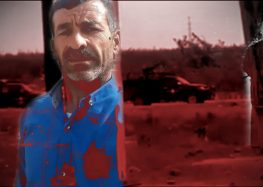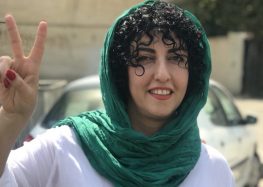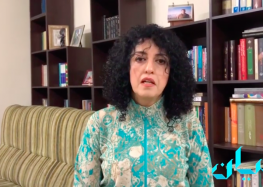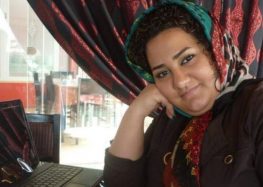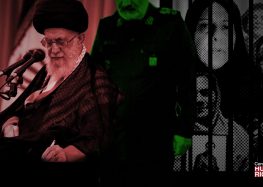Rights Activist Narges Mohammadi Speaks Out from Prison on Iran’s Brutality against Protestors
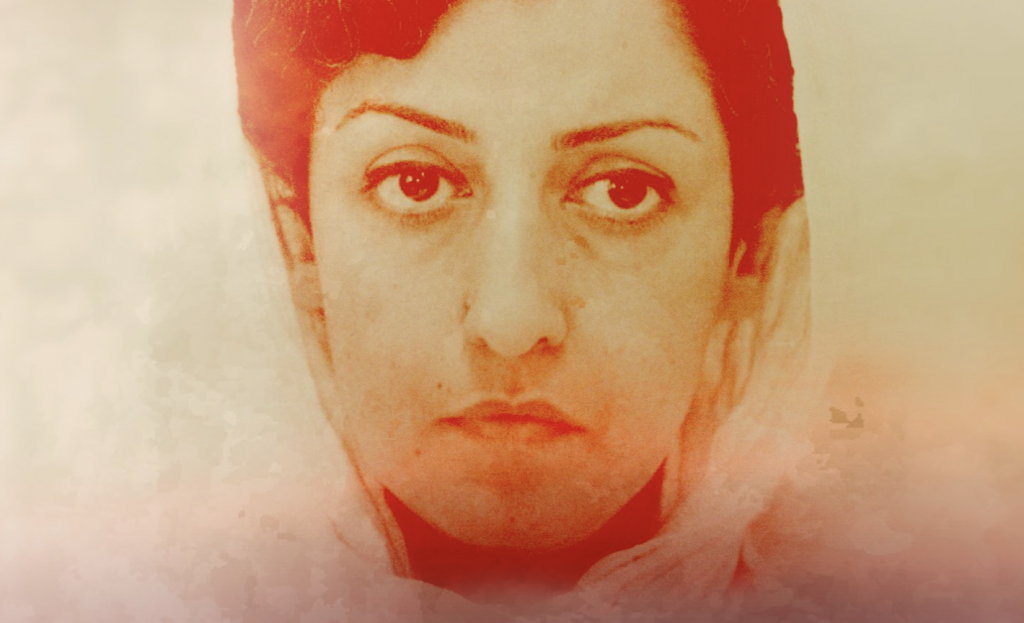 “There can only be one demand and that is the punishment of those responsible for the massacre of defenseless people. This must become a national call”
“There can only be one demand and that is the punishment of those responsible for the massacre of defenseless people. This must become a national call”
“The state has shown that it is not able to tolerate the most peaceful of protests. Even its reaction to a silent march has been to fire bullets.”
Narges Mohammadi, one of Iran’s most prominent human rights activists, recently released a letter from Evin Prison, where she has been imprisoned since 2015, in which she speaks out against the state’s violent response to the protests that swept through Iran after the government announced a sharp gasoline price hike on November 15.
Mohammadi has been serving a 16-year sentence at Evin Prison since 2015 for engaging in peaceful rights activism; she will be eligible for release only after serving 10 years.
In the letter, dated December 1, 2019, Mohammadi, wrote: “A people enraged by poverty and discrimination under a corrupt dictatorship rose to shout their anger and loathing at the authorities. However, instead of being heard, they were riddled with bullets.”
Current estimates of the numbers killed by state security force, who fired live ammunition indiscriminately into crowds of unarmed protestors, are over 200, with many more injured and thousands arrested. The numbers, which have been rising steadily after the internet shut down and news blackout that the state imposed was lifted, may rise significantly. Thousands have been arrested.
Mohammadi continued, “Protesters are the people of Iran but not the same kind as those in power. They are a people who have suffered and gone hungry. A people who have been humiliated and suppressed. A people who have tried every avenue to express criticism, seek reform and show protest but been crushed all the time. Now they are shouting for justice from the street pavement.
“The rulers say people have the right to protest. But we cannot remember any protest or criticism that was not suppressed by the state. The state has shown that it is not able to tolerate the most peaceful of protests. Even its reaction to a silent march has been to fire bullets.”
There is growing concern that those detained are being subjected to ill treatment and/or torture, and that they are being forced to make “confessions,” a routine practice in Iran. In addition, calls in hardline newspapers for draconian punishments for the protestors, including the death penalty, have further raised concerns.
Addressing these issues, Mohammadi wrote, “The judiciary chief has threatened to firmly deal with protesters by imposing harsh punishments and yet he says nothing about finding those responsible for directly firing at the people and bringing them to justice. Can you imagine or believe that justice would be served under such a system?”
Echoing international calls for accountability for the state violence, the human rights activist added: “The killing of the people, battered and exhausted under oppression, has been so vicious and violent that the state cannot offer any kind of justification. There can only be one demand and that is the punishment of those responsible for the massacre of defenseless people. This must become a national call.”
The full text of the letter follows:
“A pale young man suffering from a bullet wound is leaning on a chair in the clinic in Evin Prison. It appears he was brought in from solitary confinement because he had been knocked out by the bleeding and unbelievable swelling on his leg.
“He is a young man from Islamshahr [in Tehran Province]. He belongs to a class of people that the Islamic Republic was supposed to serve. We told him he should insist on getting treatment for his leg or else in that condition it would be amputated. He said, ‘I’m going to be executed anyway. What difference will it make with or without a leg? They haven’t even applied some Betadine [disinfectant] on my wound since I got arrested.’
“A 20-year-old girl has been transferred from the Vozara Prison to the Women’s Ward [in Evin Prison]. You can see it in her eyes: She’s very worried. She had stepped out of her car, walked towards a group of people protesting against the increase in the price of gasoline, and got arrested.
“During the interrogation, which was more like trying to get a forced confession, the interrogator had grabbed and pulled her hair, cursed at her with filthy words that are too shameful for her to repeat, opened her belt and swung it at the table and chair to scare her into agreeing to say anything he wanted in front of a camera, not once but several times.
“She, like many in her generation, had not been able to study at a university. She worked. She was transferred to Gharchak Prison and put among suspected murderers and drug addicts.
“Hundreds of our compatriots bled to death from bullets directly fired at them by agents of the state and covered broken mothers and fathers in black. The victims of dictatorship were again taken to the alter to be sacrificed. A people enraged by poverty and discrimination under a corrupt dictatorship rose to shout their anger and loathing at the authorities. However, instead of being heard, they were riddled with bullets.
“In the past and present, the state has called the protesters, ‘rioters,’ ‘saboteurs,’ ‘thugs’ and ‘hooligans’ and claimed they are not part of the Iranian people. Protesters are the people of Iran but not the same kind as those in power. They are a people who have suffered and gone hungry. A people who have been humiliated and suppressed. A people who have tried every avenue to express criticism, seek reform and show protest but been crushed all the time. Now they are shouting for justice from the street pavement.
“The rulers say people have the right to protest. But we cannot remember any protest or criticism that was not suppressed by the state. The state has shown that it is not able to tolerate the most peaceful of protests. Even its reaction to a silent march has been to fire bullets.
“The president of the country threatened to prosecute people who were peacefully protesting by stopping their cars in the streets. He boasted about having the means to control and observe protests with cameras and monitors. [Based on the Constitution,] he is the defender of people’s rights, not the state’s. He should be asked, is he not responsible for controlling the triggers that were pulled on the people of Iran? Is he not responsible for controlling the cameras in security prisons where the wounded young people of this nation are being held and tortured?
“The judiciary chief has threatened to firmly deal with protesters by imposing harsh punishments and yet he says nothing about finding those responsible for directly firing at the people and bringing them to justice. Can you imagine or believe that justice would be served under such a system?
“The killing of the people, battered and exhausted under oppression, has been so vicious and violent that the state cannot offer any kind of justification. There can only be one demand and that is the punishment of those responsible for the massacre of defenseless people. This must become a national call.
“The dictators have not learned from history. Throughout this country’s history, the suppression of every protest has set the stage for more powerful ones in the future. It is clear that the shape and size of subsequent protests will be determined by how the regime reacts to the current one.”
Narges Mohammadi
December 1, 2019
Evin Prison

